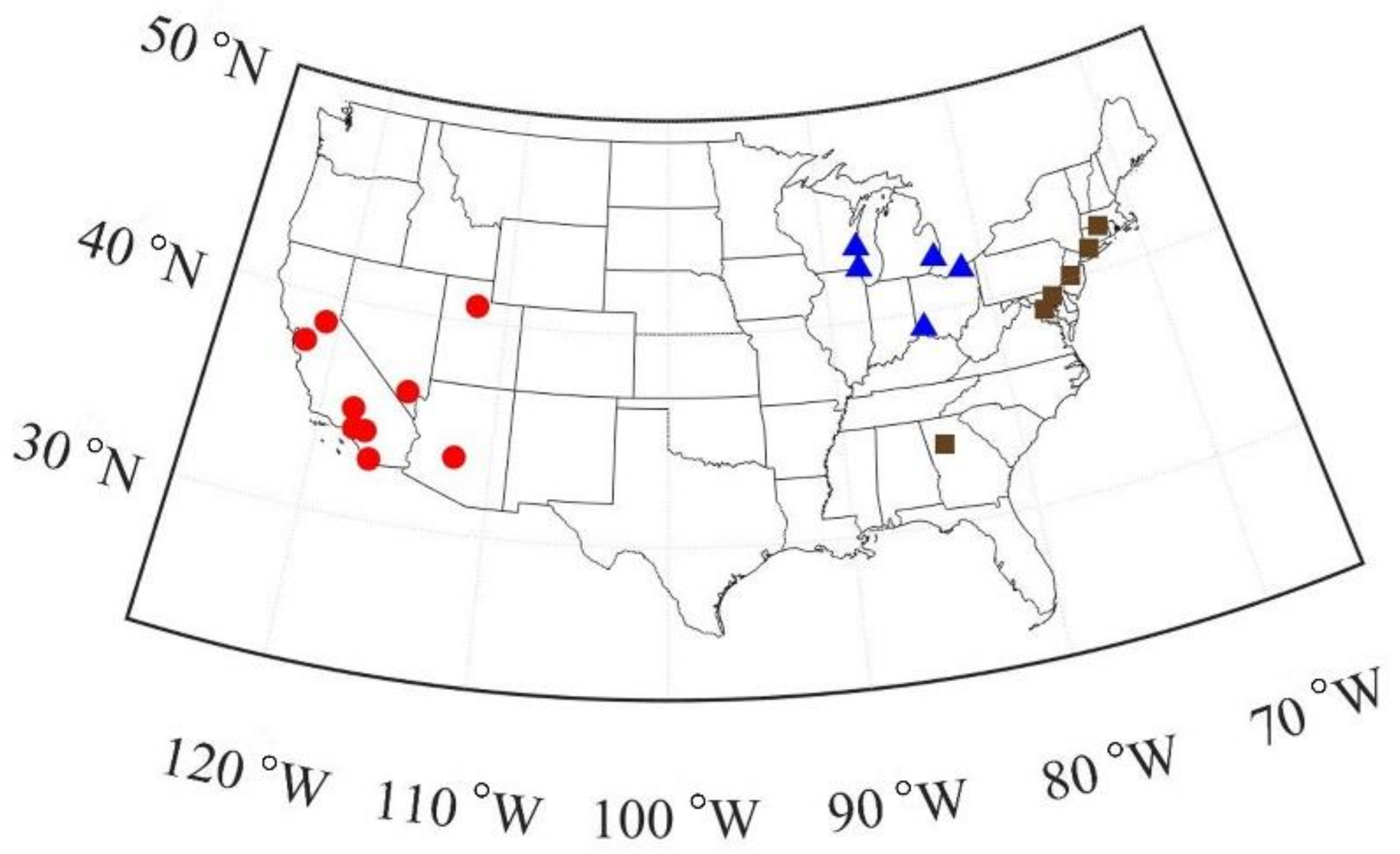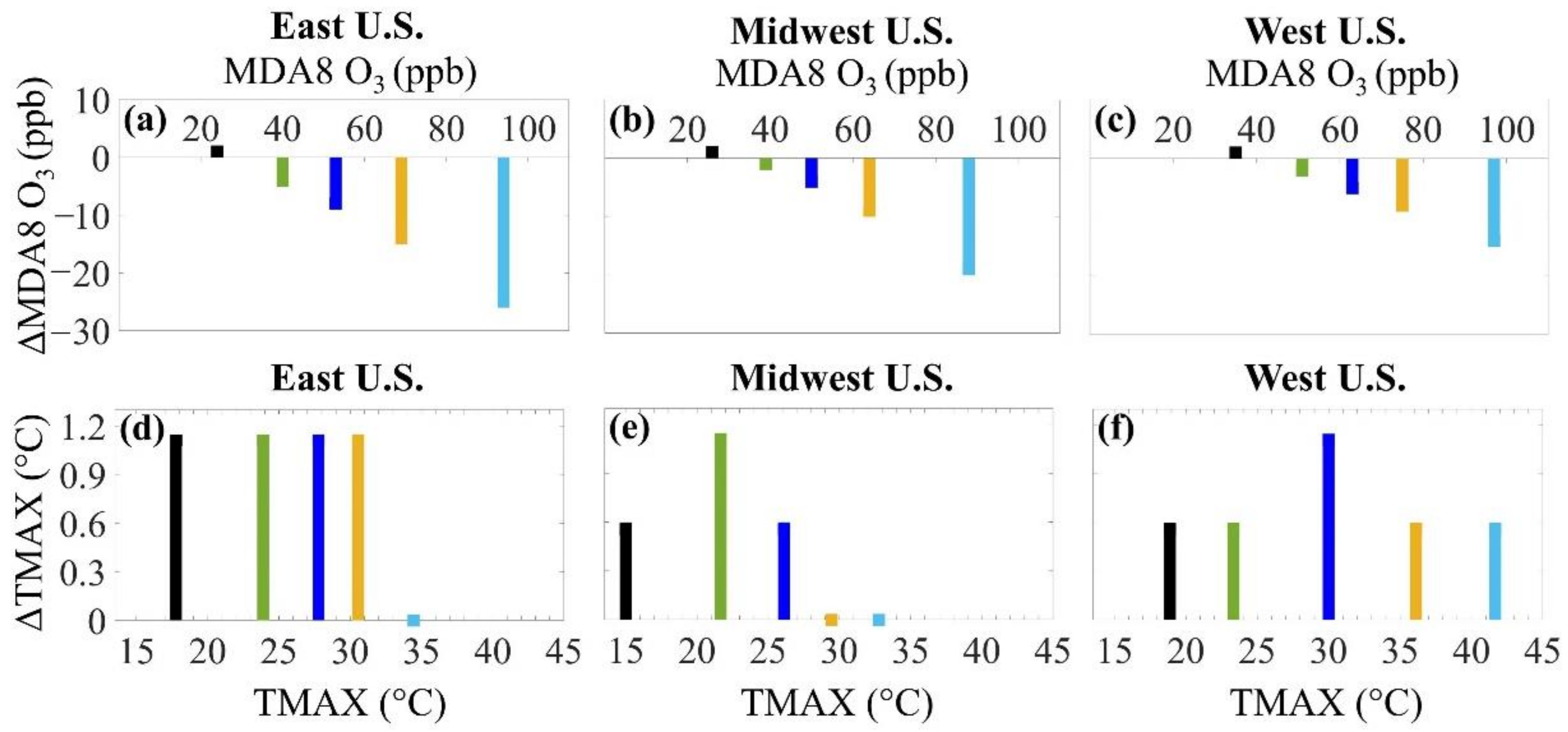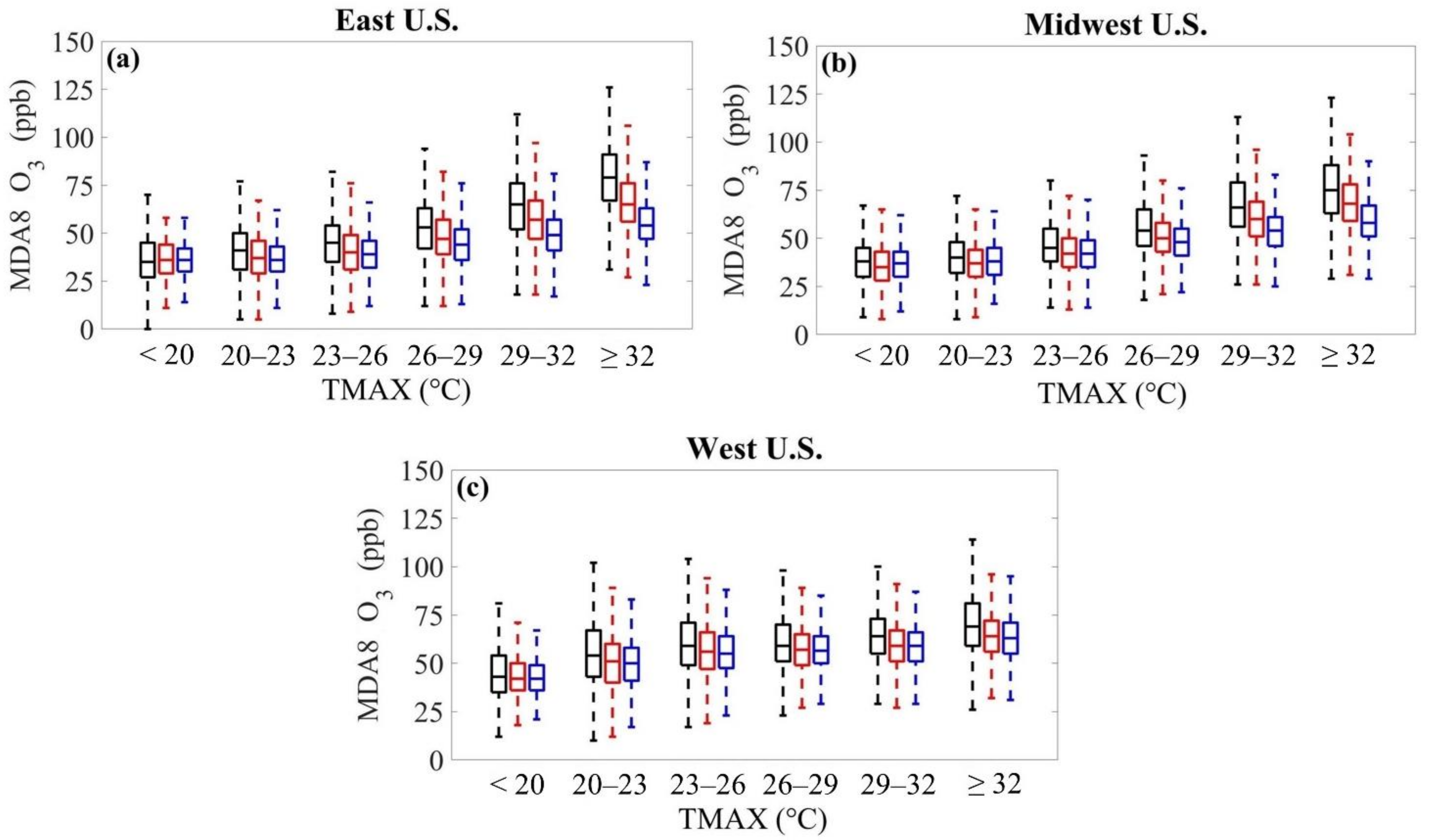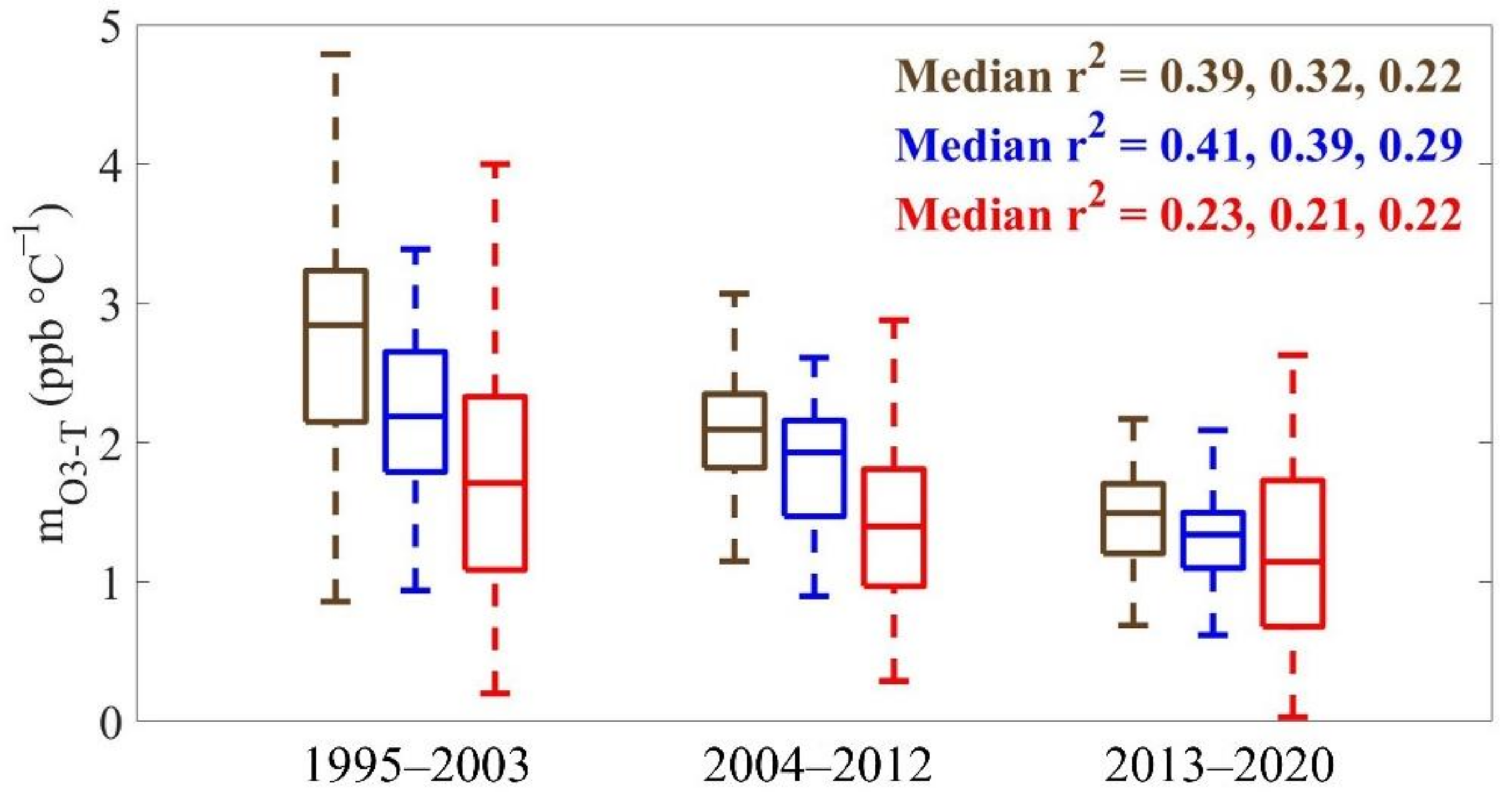Observed Relationship between Ozone and Temperature for Urban Nonattainment Areas in the United States
Abstract
1. Introduction
2. Materials and Methods
3. Results and Discussion
4. Conclusions
Supplementary Materials
Author Contributions
Funding
Institutional Review Board Statement
Informed Consent Statement
Data Availability Statement
Conflicts of Interest
References
- Ebi, K.L.; McGregor, G. Climate Change, Tropospheric Ozone and Particulate Matter, and Health Impacts. Environ. Health Perspect. 2008, 116, 1449–1455. [Google Scholar] [CrossRef]
- Lippmann, M. Health effects of tropospheric ozone. Environ. Sci. Technol. 1991, 25, 1954–1962. [Google Scholar] [CrossRef]
- Zhang, J.; Wei, Y.; Fang, Z. Ozone Pollution: A Major Health Hazard Worldwide. Front. Immunol. 2019, 10, 2518. [Google Scholar] [CrossRef] [PubMed]
- Hidy, G.M.; Blanchard, C.L. Precursor reductions and ground-level ozone in the continental United States. J. Air Waste Manage. Assoc. 2015, 65, 1261–1282. [Google Scholar] [CrossRef]
- Cooper, O.R.; Gao, R.-S.; Tarasick, D.; Leblanc, T.; Sweeney, C. Long-term ozone trends at rural ozone monitoring sites across the United States, 1990–2010. J. Geophys. Res.: Atmos. 2012, 117, D22307. [Google Scholar] [CrossRef]
- Simon, H.; Reff, A.; Wells, B.; Xing, J.; Frank, N. Ozone Trends Across the United States over a Period of Decreasing NOx and VOC Emissions. Environ. Sci. Technol. 2015, 49, 186–195. [Google Scholar] [CrossRef] [PubMed]
- Strode, S.A.; Rodriguez, J.M.; Logan, J.A.; Cooper, O.R.; Witte, J.C.; Lamsal, L.N.; Damon, M.; Van Aartsen, B.; Steenrod, S.D.; Strahan, S.E. Trends and variability in surface ozone over the United States. J. Geophys. Res.: Atmos. 2015, 120, 9020–9042. [Google Scholar] [CrossRef]
- U.S. Environmental Protection Agency (EPA). National Ambient Air Quality Standards for Ozone, 80 Fed. Reg. 65292. Available online: https://www.epa.gov/ground-level-ozone-pollution/ozone-national-ambient-air-quality-standards-naaqs (accessed on 26 October 2015).
- U.S. Environmental Protection Agency (EPA). Ozone Designation and Classification Information. Available online: https://www.epa.gov/green-book/ozone-designation-and-classification-information (accessed on 10 May 2021).
- Chen, Z.; Li, R.; Chen, D.; Zhuang, Y.; Gao, B.; Yang, L.; Li, M. Understanding the causal influence of major meteorological factors on ground ozone concentrations across China. J. Clean. Prod. 2020, 242, 118498. [Google Scholar] [CrossRef]
- Toh, Y.Y.; Lim, S.F.; von Glasow, R. The influence of meteorological factors and biomass burning on surface ozone concentrations at Tanah Rata, Malaysia. Atmos. Environ. 2013, 70, 435–446. [Google Scholar] [CrossRef]
- Zhao, K.; Bao, Y.; Huang, J.; Wu, Y.; Moshary, F.; Arend, M.; Wang, Y.; Lee, X. A high-resolution modeling study of a heat wave-driven ozone exceedance event in New York City and surrounding regions. Atmos. Environ. 2019, 199, 368–379. [Google Scholar] [CrossRef]
- Bloomer, B.J.; Stehr, J.W.; Piety, C.A.; Salawitch, R.J.; Dickerson, R.R. Observed relationships of ozone air pollution with temperature and emissions. Geophys. Res. Lett. 2009, 36, L09803. [Google Scholar] [CrossRef]
- Wu, S.; Mickley, L.J.; Leibensperger, E.M.; Jacob, D.J.; Rind, D.; Streets, D.G. Effects of 2000–2050 global change on ozone air quality in the United States. J. Geophys. Res.: Atmos. 2008, 113, D06302. [Google Scholar] [CrossRef]
- Avise, J.; Abraham, R.G.; Chung, S.H.; Chen, J.; Lamb, B.; Salathé, E.P.; Zhang, Y.; Nolte, C.G.; Loughlin, D.H.; Guenther, A.; Wiedinmyer, C.; Duhl, T. Evaluating the effects of climate change on summertime ozone using a relative response factor approach for policymakers. J. Air Waste Manage. Assoc. 2012, 62, 1061–1074. [Google Scholar] [CrossRef] [PubMed][Green Version]
- Brown-Steiner, B.; Hess, P.G.; Lin, M.Y. On the capabilities and limitations of GCCM simulations of summertime regional air quality: A diagnostic analysis of ozone and temperature simulations in the US using CESM CAM-Chem. Atmos. Environ. 2015, 101, 134–148. [Google Scholar] [CrossRef]
- Camalier, L.; Cox, W.; Dolwick, P. The effects of meteorology on ozone in urban areas and their use in assessing ozone trends. Atmos. Environ. 2007, 41, 7127–7137. [Google Scholar] [CrossRef]
- Dawson, J.P.; Adams, P.J.; Pandis, S.N. Sensitivity of ozone to summertime climate in the eastern USA: A modeling case study. Atmos. Environ. 2007, 41, 1494–1511. [Google Scholar] [CrossRef]
- Fu, T.-M.; Zheng, Y.; Paulot, F.; Mao, J.; Yantosca, R.M. Positive but variable sensitivity of August surface ozone to large-scale warming in the southeast United States. Nat. Clim. Chang. 2015, 5, 454–458. [Google Scholar] [CrossRef]
- Ito, A.; Sillman, S.; Penner, J.E. Global chemical transport model study of ozone response to changes in chemical kinetics and biogenic volatile organic compounds emissions due to increasing temperatures: Sensitivities to isoprene nitrate chemistry and grid resolution. J. Geophys. Res. Atmos. 2009, 114, D09301. [Google Scholar] [CrossRef]
- Jaffe, D.A.; Zhang, L. Meteorological anomalies lead to elevated O3 in the western U.S. in June 2015. Geophys. Res. Lett. 2017, 44, 1990–1997. [Google Scholar] [CrossRef]
- Olszyna, K.J.; Luria, M.; Meagher, J.F. The correlation of temperature and rural ozone levels in southeastern U.S.A. Atmos. Environ. 1997, 31, 3011–3022. [Google Scholar] [CrossRef]
- Rasmussen, D.J.; Fiore, A.M.; Naik, V.; Horowitz, L.W.; McGinnis, S.J.; Schultz, M.G. Surface ozone-temperature relationships in the eastern U.S.: A monthly climatology for evaluating chemistry-climate models. Atmos. Environ. 2012, 47, 142–153. [Google Scholar] [CrossRef]
- Sillman, S.; Samson, P.J. Impact of temperature on oxidant photochemistry in urban, polluted rural and remote environments. J. Geophys. Res. Atmos. 1995, 100, 11497–11508. [Google Scholar] [CrossRef]
- Steiner, A.L.; Davis, A.J.; Sillman, S.; Owen, R.C.; Michalak, A.M.; Fiore, A.M. Observed suppression of ozone formation at extremely high temperatures due to chemical and biophysical feedbacks. Proc. Natl. Acad. Sci. USA 2010, 107, 19685–19690. [Google Scholar] [CrossRef] [PubMed]
- Pusede, S.E.; Steiner, A.L.; Cohen, R.C. Temperature and Recent Trends in the Chemistry of Continental Surface Ozone. Chem. Rev. 2015, 115, 3898–3918. [Google Scholar] [CrossRef] [PubMed]
- Jin, X.; Fiore, A.M.; Murray, L.T.; Valin, L.C.; Lamsal, L.N.; Duncan, B.; Boersma, K.F.; De Smedt, I.; Abad, G.G.; Chance, K.; Tonnesen, G.S. Evaluating a Space-Based Indicator of Surface Ozone-NOx-VOC Sensitivity Over Midlatitude Source Regions and Application to Decadal Trends. J. Geophys. Res. Atmos. 2017, 122, 10439–10461. [Google Scholar] [CrossRef] [PubMed]
- Jin, X.; Fiore, A.; Boersma, K.F.; De Smedt, I.; Valin, L. Inferring Changes in Summertime Surface Ozone-NOx-VOC Chemistry over U.S. Urban Areas from Two Decades of Satellite and Ground-Based Observations. Environ. Sci. Technol. 2020, 54, 6518–6529. [Google Scholar] [CrossRef]
- Lenssen, N.J.L.; Schmidt, G.A.; Hansen, J.E.; Menne, M.J.; Persin, A.; Ruedy, R.; Zyss, D. Improvements in the GISTEMP Uncertainty Model. J. Geophys. Res. Atmos. 2019, 124, 6307–6326. [Google Scholar] [CrossRef]
- Robustfit: Robust Regression. Available online: https://www.mathworks.com/help/stats/robustfit.html (accessed on 12 May 2021).
- Rieder, H.E.; Fiore, A.M.; Horowitz, L.W.; Naik, V. Projecting policy-relevant metrics for high summertime ozone pollution events over the eastern United States due to climate and emission changes during the 21st century. J. Geophys. Res.: Atmos. 2015, 120, 784–800. [Google Scholar] [CrossRef]
- Lin, C.-Y.C.; Jacob, D.J.; Munger, J.M.; Fiore, A.M. Increasing background ozone in surface air over the United States. Geophys. Res. Lett. 2000, 27, 3465–3468. [Google Scholar]
- Parker, D.E. Urban heat island effects on estimates of observed climate change. WIREs Clim. Chang. 2009, 1, 123–133. [Google Scholar] [CrossRef]
- McGrath-Spangler, E.L.; Denning, A.S. Estimates of North American summertime planetary boundary layer depths derived from space-borne lidar. J. Geophys. Res. Atmos. 2012, 117, D15101. [Google Scholar] [CrossRef]
- Langford, A.O.; Alvarez II, R.J.; Brioude, J.; Fine, R.; Gustin, M.S.; Lin, M.Y.; Marchbanks, R.D.; Pierce, R.B.; Sandberg, S.P.; Senff, C.J.; Weickmann, A.M.; Williams, E.J. Entrainment of stratospheric air and Asian pollution by the convective boundary layer in the southwestern U.S. J. Geophys. Res. Atmos. 2017, 122, 1312–1337. [Google Scholar] [CrossRef]
- Jaffe, D.A.; Fiore, A.M.; Keating, T.J. Importance of Background Ozone for Air Quality Management. The Magazine for Environmental Managers. November 2020, pp. 1–5. Available online: https://pubs.awma.org/flip/EM-Nov-2020/jaffe.pdf (accessed on 24 August 2021).
- National Interagency Fire Center. Fire Information: Statistics. Available online: https://www.nifc.gov/fire-information/statistics (accessed on 11 August 2021).
- Akagi, S.K.; Yokelson, R.J.; Wiedinmyer, C.; Alvarado, M.J.; Reid, J.S.; Karl, T.; Crounse, J.D.; Wennberg, P.O. Emission factors for open and domestic biomass burning for use in atmospheric models. Atmos. Chem. Phys. 2011, 11, 4039–4072. [Google Scholar] [CrossRef]
- Andreae, M.O. Emission of trace gases and aerosols from biomass burning–an updated assessment. Atmos. Chem. Phys. 2019, 19, 8523–8546. [Google Scholar] [CrossRef]
- Lindaas, J.; Pollack, I.B.; Garofalo, L.A.; Pothier, M.A.; Farmer, D.K.; Kreidenweis, S.M.; Campos, T.L.; Flocke, F.; Weinheimer, A.J.; Montzka, D.D.; et al. Emissions of Reactive Nitrogen From Western U.S. Wildfires During Summer 2018. J. Geophys. Res. Atmos. 2020, 125, e2020JD032657. [Google Scholar]
- Flynn, M.T.; Mattson, E.J.; Jaffe, D.A.; Gratz, L.E. Spatial patterns in summertime surface ozone in the Southern Front Range of the U.S. Rocky Mountains. Elementa Sci. Anthr. 2021, 9, 1. [Google Scholar]
- Jaffe, D.A. Evaluation of Ozone Patterns and Trends in 8 Major Metropolitan Areas in the U.S.; A-124; Coordinating Research Council, Inc.: Alpharetta, GA, USA, 2021; Available online: http://crcao.org/wp-content/uploads/2021/04/CRC-Project-A-124-Final-Report_Mar2021.pdf (accessed on 24 August 2021).
- Lindaas, J.; Farmer, D.K.; Pollack, I.B.; Abeleira, A.; Flocke, F.; Roscioli, R.; Herndon, S.; Fischer, E.V. Changes in ozone and precursors during two aged wildfire smoke events in the Colorado Front Range in summer 2015. Atmos. Chem. Phys. 2017, 17, 10691–10707. [Google Scholar] [CrossRef]
- Gong, X.; Kaulfus, A.; Nair, U.; Jaffe, D.A. Quantifying O3 Impacts in Urban Areas Due to Wildfires Using a Generalized Additive Model. Environ. Sci. Technol. 2017, 51, 13216–13223. [Google Scholar] [CrossRef]
- Jaffe, D.A.; Wigder, N.; Downey, N.; Pfister, G.; Boynard, A.; Reid, S.B. Impact of Wildfires on Ozone Exceptional Events in the Western U.S. Environ. Sci. Technol. 2013, 47, 11065–11072. [Google Scholar] [CrossRef]
- McClure, C.D.; Jaffe, D.A. Investigation of high ozone events due to wildfire smoke in an urban area. Atmos. Environ. 2018, 194, 146–157. [Google Scholar] [CrossRef]
- U.S. Environmental Protection Agency (EPA). Air Data: Air Quality Data Collected at Outdoor Monitors Across the US. Available online: https://www.epa.gov/outdoor-air-quality-data (accessed on 26 April 2021).
- National Centers for Environmental Information. Global Historical Climatology Network Daily. Available online: https://www.ncei.noaa.gov/products/land-based-station/global-historical-climatology-network-daily (accessed on 26 April 2021).




Publisher’s Note: MDPI stays neutral with regard to jurisdictional claims in published maps and institutional affiliations. |
© 2021 by the authors. Licensee MDPI, Basel, Switzerland. This article is an open access article distributed under the terms and conditions of the Creative Commons Attribution (CC BY) license (https://creativecommons.org/licenses/by/4.0/).
Share and Cite
Ninneman, M.; Jaffe, D. Observed Relationship between Ozone and Temperature for Urban Nonattainment Areas in the United States. Atmosphere 2021, 12, 1235. https://doi.org/10.3390/atmos12101235
Ninneman M, Jaffe D. Observed Relationship between Ozone and Temperature for Urban Nonattainment Areas in the United States. Atmosphere. 2021; 12(10):1235. https://doi.org/10.3390/atmos12101235
Chicago/Turabian StyleNinneman, Matthew, and Daniel Jaffe. 2021. "Observed Relationship between Ozone and Temperature for Urban Nonattainment Areas in the United States" Atmosphere 12, no. 10: 1235. https://doi.org/10.3390/atmos12101235
APA StyleNinneman, M., & Jaffe, D. (2021). Observed Relationship between Ozone and Temperature for Urban Nonattainment Areas in the United States. Atmosphere, 12(10), 1235. https://doi.org/10.3390/atmos12101235





